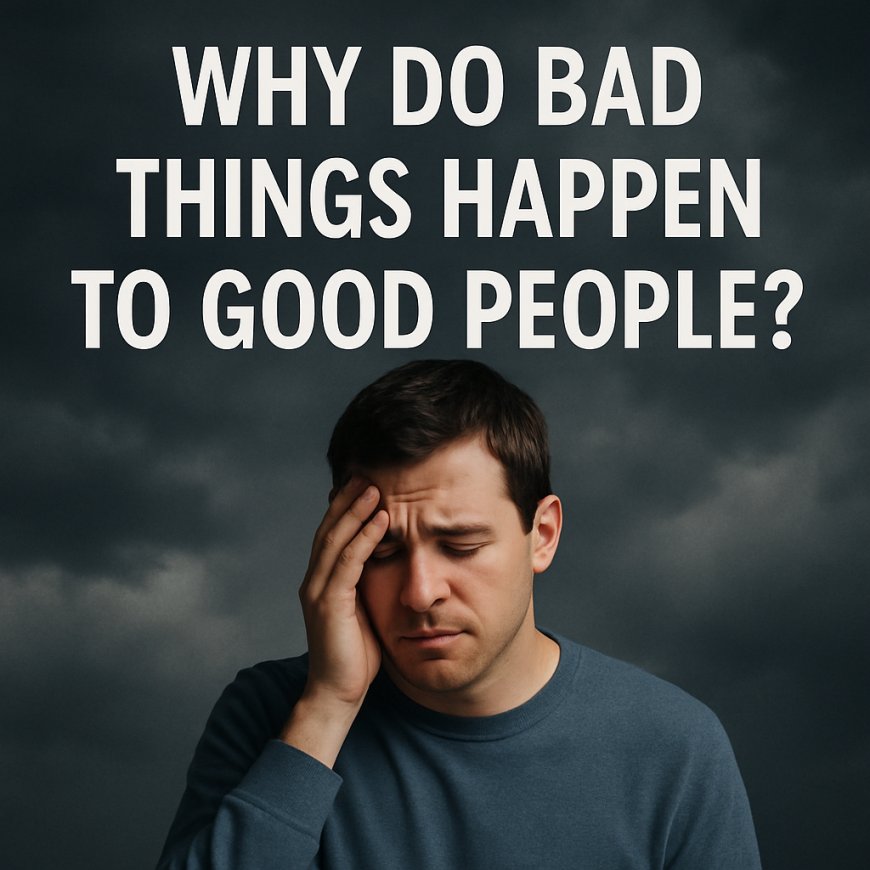Why Do Bad Things Happen to Good People?
The question “Why do bad things happen to good people?” is more complex than it seems. This article explores the assumptions behind our ideas of fairness, goodness, and suffering—challenging conventional thinking and inviting readers to reflect on the universal nature of life’s ups and downs.

You have likely heard this question many times. Perhaps, you have even asked it yourself. Prompted by unfortunate incidents or terrible events that happen to people who we perceive to not deserve such unfairness, there is a tendency to ask “why do bad things happen to good people?”
While we can collectively sympathize with others when harm befalls them, it is time to scrutinize the appropriateness of the question and its assumptions. This article will take a look at the foundational assumptions behind the question of why bad things happen to good people.
In life, things happen. Some of these things are desirable and pleasurable, and they make life easier and more comfortable, so they are “good” things. Examples are all around us; they include finding a well-paying job, getting admission into the university, eating three times a day, living with no disabilities, and so on.
Some other events in life are undesirable and painful. They make life more difficult and reduce comfort. We regard them as “bad”. Examples include death, sickness, accidents, job termination, expulsion from school, physical or psychological abuse, among others.
Both kinds of events, good and bad, happen in everyone’s lives. Desirable things and undesirable things happen to us all, regardless of race, religion, location, or lifestyle. While it can be argued that some people are better off than others, either due to financial status, family background or other perceived advantage, the concept in itself is very subjective.
One man has millions in the account while he battles a health challenge with no cure. Another man is sick and has no money to get treated. It is easy to conclude that the second man is worse off since he has no money. Say, the second man is funded by a creditor but he has to work long hours to pay his debt and the first man spends his days in chronic pain, unable to spend his money. Who is better off now? The subjectivity is apparent.
The assumption that bad things happen to good people is faulty because good things happen to good people, just as bad things happen to bad people. In essence, good and bad things happen to good and bad people. Better yet, things happen to people, as life happens to us all.
This leads us right to the second assumption. Some people who bad things happen to are good. How do we come to this conclusion?
We have established that good and bad things happen to all people. When we say that bad things happen to good people, we segregate the world’s populace. In our mind’s eye, we acknowledge two factions, the good people (who do not deserve bad things) and the bad people (who deserve bad things). On the surface, this looks perfectly rational. But let us look deeper.
How do we define goodness (and therefore badness)? Are good people those who are law-abiding? Or are they people who live by the rules of our own religion? Rather, are they people who share our values and agree with our perspectives? When we are able to properly define how we assess goodness in people, we have another question to answer. Are people inherently (and totally) good?
If good people are law-abiding, then are you not a bad person for littering the streets or running a red light? We are rational enough to appreciate that these singular acts, although wrong, do not in themselves make a person bad. We might even point to the concept of first-time versus repeat offenders.
Well then, if good people are those who live according to our own religion, we are all bad people. Because you would be bad to people of other religions, just as they would be bad to you. Shared values and perspectives present a similar case. If I am good because our values are similar, it follows that to some person out there whom we differ from, we are undoubtedly bad people.
There is another dimension to the goodness or badness of people. Are humans only either truly bad or truly good? Can a single individual really be a good person to everybody they come across? Can a person be a completely bad person to everyone they have ever met? If everyone is partly good and partly bad, some people arguably more of one than others, how do we determine who is deserving of what?
A charming, wonderful lady is liked by almost everyone on her street, but to certain people, she is perceived to be a schemer and a manipulator. A corrupt executive embezzles funds from his company and covers up the fraud. But he suspends personal hobbies to spend time with his children and donates a kidney to save the life of his cousin.
Both of them die in an accident. Did a bad thing happen to good people? Did a bad thing happen to bad people? Or did an unfortunate thing happen, and should our empathy and prayers be with the family and loved ones of the deceased who have experienced the loss?







